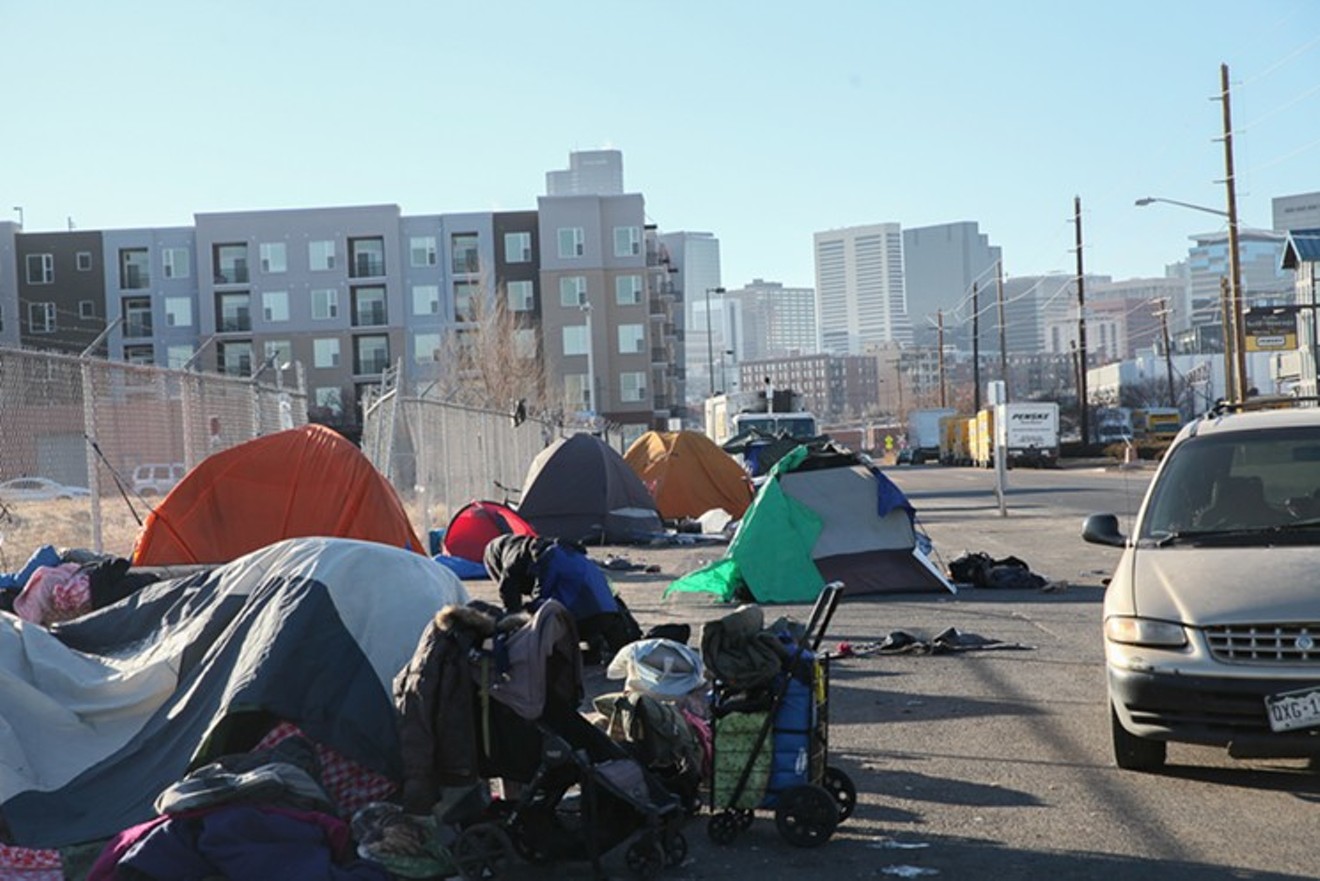Remember that big federal lawsuit in which thousands of people experiencing homelessness are suing Denver, alleging that their constitutional rights are being violated during sweeps of their encampments? We caught up with the representing attorney, Jason Flores-Williams, to find out the latest.
But first, a quick primer:
The saga began back in August 2016, when Flores-Williams sued the city — as well as Mayor Michael Hancock and Denver Police Chief Robert White — in federal court, alleging that the constitutional rights of the homeless were being violated when the city conducted large-scale sweep operations. Flores-Williams alleged that Denver violated the Fourth and Fourteenth amendments (protection against unlawful searches and seizures and the equal-protection clause, respectively) when it was confiscating — and in some instances trashing — the belongings of people experiencing homelessness.
In April 2017, the case became a big deal when U.S. District Court Judge William Martinez made the rare step of granting class certification, making every person experiencing homelessness in Denver (over 3,000 people) a plaintiff in the case against the city. Flores-Williams called the ruling “historic” at the time, and the suit soon gained additional firepower when civil-rights attorney David Lane jumped on board as Flores-Williams’s co-counsel.
The two attorneys gathered evidence through depositions of city officials and by requesting city emails, and were so confident in the strength of the evidence they obtained that they filed a motion for summary judgment in August — meaning they asked the federal court to rule without a full trial. In response, the city also made its own motion for summary judgment.
Our recent interview with Flores-Williams explains things from there.
Westword: When are you expecting to hear from the court regarding the motions for summary judgment?
Jason Flores-Williams: Usually the court is supposed to respond within six months. So because we filed last August, it could be any day now.
What’s the main difference between your motion for summary judgment and the city’s?
We're right and they're wrong [laughs]. But, really, it’s that ours shows, factually, what happened to large amounts of people when the city straight-up stormtrooped encampments, [like] at Arkins Court [in July 2016].
The city's, as is usual, is procedurally based. It's an attempt to out-procedure us. They filed what's called a motion to strike, which is a way of trying to get rid of the evidence. The city has also, in their opposition to our motion for summary judgment, tried to put distance between themselves and any bad actors out there. So they try to separate what park rangers did, what DPD was aware of, what the mayor was aware of. It’s parsing the liability. The reality is that there is about a thousand yards of intentionally constructed procedure that's been injected by corporations and cities and other powerful bad actors so that they're never held responsible for what they end up doing to people.
If the federal court agrees to a summary judgment and rules in your favor, what might that ruling look like?
The most typical remedy would be requiring some kind of hearing or due-process proceedings regarding someone’s possessions if police were trying take them.
Would the camping ban be affected at all?
No, that’s not part of this. It’s not included because I’ve seen all of the other cases across the country where constitutional challenges of camping bans haven’t succeeded.
What do you think will happen?
I think we have real ground to prevail. However, I would not be surprised if [the opposing] motions for summary judgment balance each other out and we end up having to go to trial. So I think, ultimately, we'll end up by the end of this year going to a monster trial.
What would that trial look like?
This is where it gets complicated and uninteresting [laughs]. You get to choose between having a federal judge making a ruling or a jury making a ruling. I always prefer a jury but would have to refer to co-counsel. At the same time, the weight of having a federal judge making a ruling sets a greater precedent than a jury, which would award money through damages.
No matter what, it's a landmark case as far as the treatment of the homeless and [dispossession] by a city like Denver that has tons of money. It cannot simply cast aside the poor and people who didn't have leverage in the name of making a buck for the stockbrokers who control the development corporations that invariably invest in the city government and elections and ultimately hold sway over politics. This mayor's office has been one of the most pro-developement mayor's offices in the country, as far as I can tell.
[
{
"name": "Air - MediumRectangle - Inline Content - Mobile Display Size",
"component": "12017618",
"insertPoint": "2",
"requiredCountToDisplay": "2"
},{
"name": "Editor Picks",
"component": "17242653",
"insertPoint": "4",
"requiredCountToDisplay": "1"
},{
"name": "Inline Links",
"component": "18838239",
"insertPoint": "8th",
"startingPoint": 8,
"requiredCountToDisplay": "7",
"maxInsertions": 25
},{
"name": "Air - MediumRectangle - Combo - Inline Content",
"component": "17261320",
"insertPoint": "8th",
"startingPoint": 8,
"requiredCountToDisplay": "7",
"maxInsertions": 25
},{
"name": "Inline Links",
"component": "18838239",
"insertPoint": "8th",
"startingPoint": 12,
"requiredCountToDisplay": "11",
"maxInsertions": 25
},{
"name": "Air - Leaderboard Tower - Combo - Inline Content",
"component": "17261321",
"insertPoint": "8th",
"startingPoint": 12,
"requiredCountToDisplay": "11",
"maxInsertions": 25
}
]













